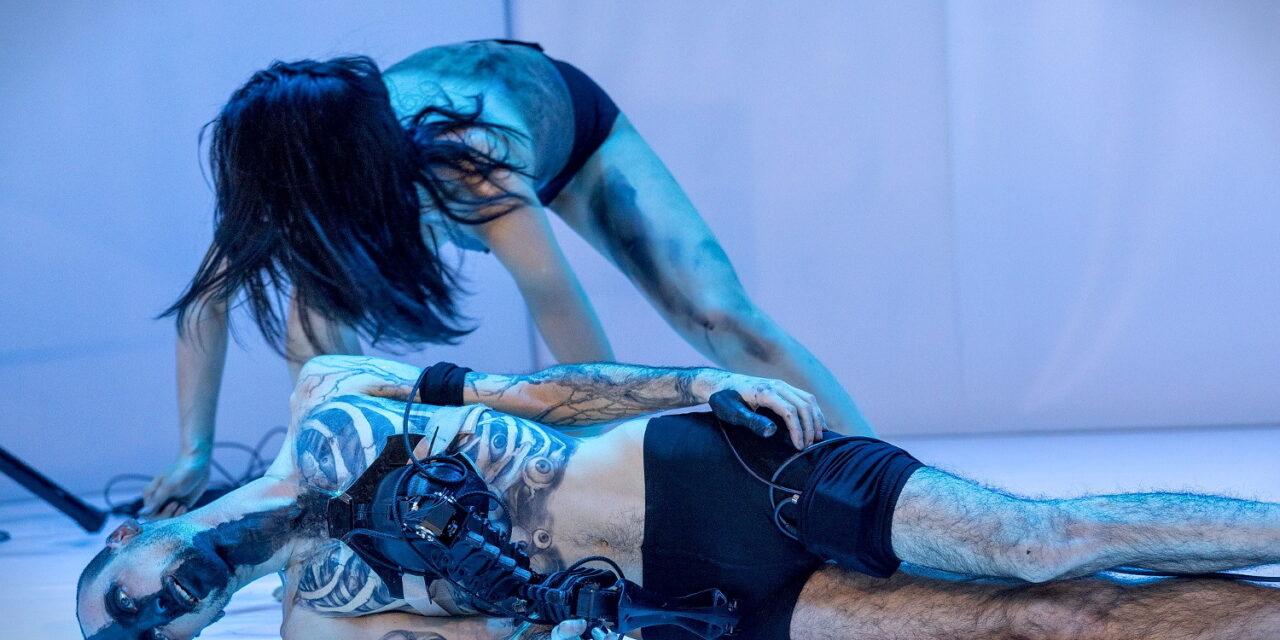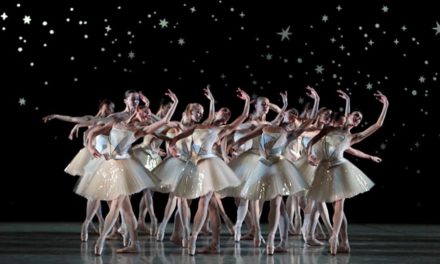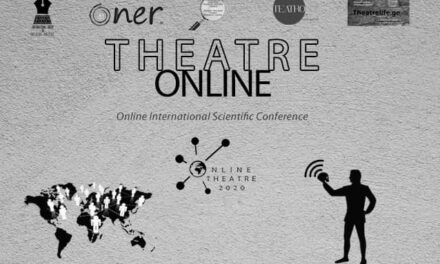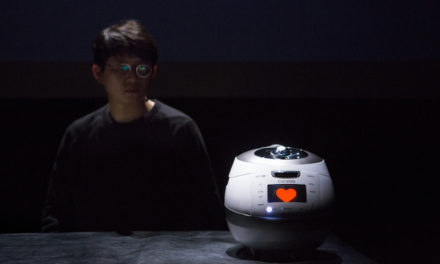Creativity is mostly regarded as one of the last domains of the human species and it serves as a key element in the construction of the idea that the human species would be exceptional. My interest in confronting this discourse is grounded in my belief that the human species alone is not making history. The human species has always been in co-evolution: with bacteria, animals, machines. It is the discourse of human exceptionalism that brought us to this present and very troubling situation that has been described by some as the age of the sixth mass extinction of living species. Recently, digital machines, based on Deep Learning, have started to produce paintings, musical scores or dance pieces that were able to create aesthetic experiences in their recipients. This fact is worth further investigating, not at least because it is putting the discourse of creativity as an exclusive human capability to the task. My focus for this essay is on the theatre and its continuous integration of the realities of information networks and digital realities during the last two decades. I am discussing examples in this essay, that provide us with hints about how we could welcome and appropriate these integrations. Especially, I will point out how much the practice of dramaturgy is crucial for any attempt of appropriating these new realities. The need for such an appropriation derives mainly from the fact that the digital realities are deeply embedded in the reckless logic of the accumulation of capital.
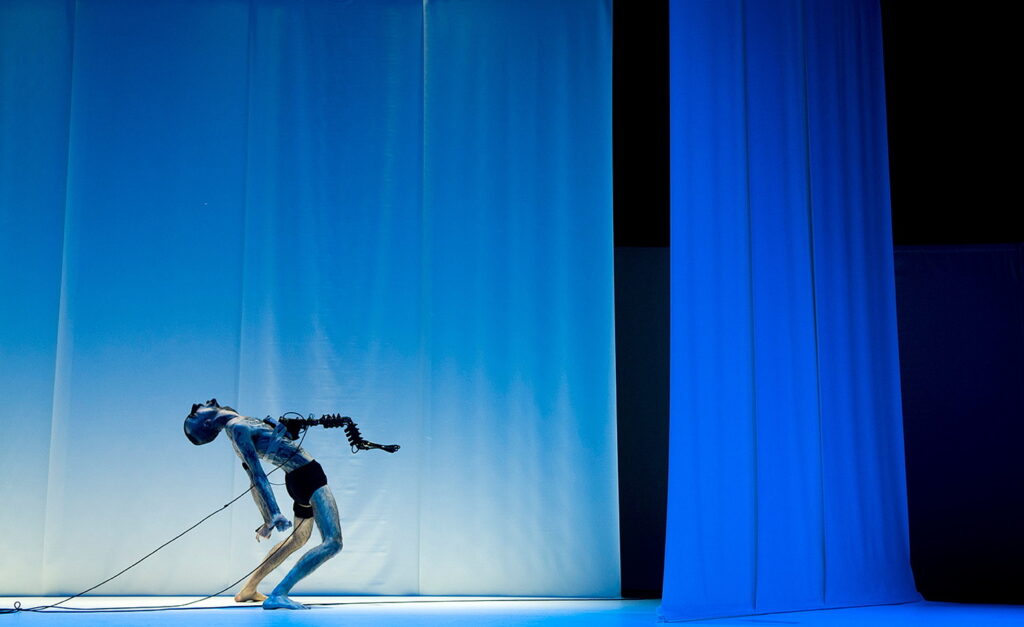
Marco Donnarumma and an AI driven robot in Alia: Zǔ tài. Photo by Donnarumma Kong + Underskin Photography
In this essay, I will (1.) introduce my understanding of dramaturgy, then (2.) I will present two examples of recent performances that are making use of information networks and Artificial Intelligence and then (3.) I will discuss how the dramaturgy of these two examples are challenging aesthetic beliefs of the 20th century and are contributing to an appropriation of the digital realities through theatre.
(1.) Three notions of Dramaturgy: Dramaturgy as an imagined artistic-political field, as a profession and as an academic subject
An introduction to the concept of dramaturgy must distinguish between three different levels of meaning. Historically, the signifier “Dramaturgy” has appeared as an imagined artistic-political field, as an institutionalized profession within a theater system, and as an academic subject.
Dramaturgy as an imagined artistic-political field and as a profession
When Lessing wanted to overcome the rules and politics of classical French theatre in the 18th century, he has started a discourse on a thing he called “dramaturgy” by writing the “Hamburgische Dramaturgie”. Brecht’s attempt, with reference to the concepts of dramaturgy and production dramaturgy, to overcome the identification-based theatre is, I understand, a follow-up to Lessing’s “Hamburgische Dramaturgie”. For both Lessing and Brecht, the search for other ways of (re)presenting theater is intimately connected with their project of making new social agents and/or dynamics visible on the theater stage. This is also the difference to the Aristotelian use of the term, which aims exclusively at artistic practice. In this sense, dramaturgy is never a mere application of rules to performance. Quite the opposite: dramaturgy becomes necessary precisely when there are no more rules.
The political artistic field of dramaturgy was imagined by Lessing and Brecht before the profession of the dramaturge was established in the institutionalized theatre system of Germany. Although Brecht strongly influenced the profession of dramaturgy through the introduction of “production dramaturgy” at the Berliner Ensemble, it dates back to the time of the NS period. The NS Regime introduced the function of the dramaturge at the state and city theatres throughout the country as ideological police that should monitor the making of theatre. Dramaturgy as a filed imaginary and as an institutionalized profession have thus both arisen from a need to govern the art of theatre for certain political ends. The dramaturgy must always be aware of this partly dangerous genealogy.
Dramaturgy as an academic subject
In my understanding of dramaturgy as an academic subject, I emphasize above all its political potential to change regimes of visibility and thus turn theatre performances into a public space of possibilities for the formation of new subjectivities. If dramaturgy is also pursued as an academic subject, it must answer the following questions that are constitutive for academic subjects:
1) What are the objects of dramaturgy? (ontological question)
2) What kind of insights does dramaturgy produce? (epistemological question)
3) Which methods does the dramaturgy use? (methodological question)
The objects of dramaturgy
The dramaturgy deals with the preparation and execution of performances. Within this subject area it is particularly concentrated on the following four practices:
-curation (selection and montage of fictional and/or non-fictional materials in order to introduce a discourse)
-narration (creation of meaningful combinations of dramatic and/or performative actions),
-economy (balance between artistic demands and financial needs; also: management, organization, publicity, and communication), and
–format development.
By format development, I mean the invention and design of the performance situation (Aufführungssituation). This field of dramaturgical action aims towards the artistic problem of who assembles in what way in order to enable a shared public communication. From the perspective of format development, dramaturgy could thus be understood, borrowing the words from the scholar of dramaturgy Jochen Kiefer, as the “question of the possibility of theatre”. It is precisely this dramaturgical area of format development that breaks new ground in times of digital technology-induced shaking of conventional theatrical appointments by negotiating and producing new visibilities for socio-economic driving forces and subjectivities.
The insights of dramaturgy
If dramaturgy is to be pursued as an academic subject, the question arises as to what dramaturges are experts for. On the one hand, they are able to understand and reproduce scientific discourses. This ability ideally extends to more and more scientific discourses, caused by the fraying of the theatre into the various fields of science. For the scholar of dramaturgy Jochen Kiefer, the real expertise of dramaturgy lies in the fact that it is capable of “arranging the not knowing” (das Nichtwissen zu ordnen): If you enter into an aesthetic-artistic process, it implies that you don’t know everything at the beginning and during the whole process. The essential distinction that dramaturgy makes in this context is that it asks about the very particular kind of not knowing one is dealing with at a concrete moment. Dramaturgy then tries to make these different kinds of not knowing productive. In this context, Kiefer develops a systematized order of not knowing. Individually, the question arises as to whether it is a question of ignorance known or unknown to the individual; from a social point of view, there is intentional and unintentional not knowing, and in a temporal dimension there is a not yet knowing and a not being able to know at all. The productivity of dramaturgy lies in the clear formulation of not knowing and the transfer of knowledge into doubt.
For me, this epistemological dimension of dramaturgy is closely related to its political potential. For only by including that what we do not know into performance one can irritate the existing regimes of visibility and power.
The method of dramaturgy
Jochen Kiefer, consistently with the above remarks, describes the dramaturgical rehearsal as a “controlled condition of not knowing”. The rehearsal can thus be understood as a method of dramaturgy; it is the concrete process in which not knowing is getting arranged.
2) Please Love Austria! and Alia: Zǔ tài
The following two examples, Christoph Schlingensiefs`s Please Love Austria! and Marco Donnarumma and Nunu Kong`s (吴艳丹) Alia: Zǔ tài, present dramaturgical formats that have arisen from the special nature of the information economy in the age of digital media and AI implementation. The dramaturgy of both examples attempts to order the effects of this age on our social and human condition and to turn the digital itself into theatrical material.
Christoph Schlingensief’s Please Love Austria!
The first example is Christoph Schlingensief’s Please Love Austria! from the year 2000. During this project, twelve asylum seekers (it remained uncertain if they were real or not) lived 24 hours each day of the project in a container camp next to the Vienna State Opera. The Internet channel www. Freetv.com broadcasted the lives of these asylum seekers on the Internet around the clock with ten cameras. With the help of special telephone numbers, two of them were to be selected every day to leave the country and be deported. This rule was a clear reference to the then very popular TV show “Big Brother”.
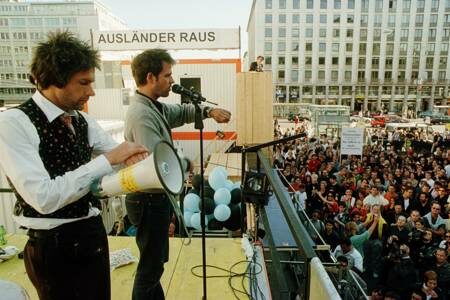
Christoph Schlingensief (right) in Please Love Austria
The essential point for my argument is that the format of this performance was not primarily determined by the performance at Herbert von Karajahn Platz, where the container was located. Rather, the format aimed at the mass media and the Internet, which even allowed direct participation in the performance. This performance format was thus meant less for a classical audience, which gathers in darkened theatres, but rather for a public sphere constituted by the mass media
Marco Donnarumma and Nunu Kongs Alia: Zǔ tài
The second example is the performance Alia: Zǔ tài by Marco Donnarumma and Nunu Kong, which premiered in the cities of Berlin and Shanghai in 2018. The title of this dance and music performance is composed of the Latin word “alia” and the Chinese “zǔ tài (组态)“, which means structure or configuration. In this performance, three performers interact with two robots equipped with artificial intelligence. This piece is driven by Marco Donnarumma’s question as to whether there are ways to escape the normative violence to which our bodies are subjected. Therefore, inspired by recent results in the field of AI application, he searches for other forms of inhabiting embodiment. The work “shows 2 machine actors in the form of AI prosthetic robots. The prostheses developed by Donnarumma in collaboration with the Neurorobotics Research Laboratory in Berlin use AI tools and humanoid robotics to mimic animal body coordination. Using haptic sensors and neural networks, the machines react to the actions of the three performers on the stage or to the physical limitations of their own environment.” Dancers and machines thus rediscover the self and the other; they explore the new possibilities of subjectivities brought about by the increasing use of artificial intelligence.
(3.) Dramaturgies of Digital Realities
Evaluating both examples, it is noticeable that they challenge at least three basic aesthetic convictions of the 20th century: namely that there is a necessary fix connection between form and medium; that theatre would consist in the bodily co-presence of performers and spectators, and that theatre has to happen at one concrete geographical site.
In Please Love Austria! one can see that under the regime of information networks there no longer has to be a direct connection between form and medium. The mediality of the site-specific performance becomes inseparable from an online-based voting game and the uncontrollable press coverage becomes an integral part of the mediality of the performance, too. The form of Please Love Austria!, on the other hand, shifts analogously to the oscillation of mediality: from satire to farce to politically engaged art.
The performance of the neuronal networks in Alia: Zǔ tài illustrates the fact that the material stock for the medium of theatre is no longer exclusively bound to the human world and that this is the reason why theatre can no longer be defined by the mere co-presence of human bodies.
Furthermore, in Please Love Austria! a theatre gets palpable that in principle is no longer bound to one single, material place, but one that is essentially dislocated.
Both discussed theatre works radically question the possibility of theatre and thus extend its realm:
The format of Please Love Austria! points to the lack of our knowledge related to the loss of physical places for public political debate and the shift of debate to the virtual. In the format of Alia: Zǔ tài, our uncertainty regarding the fluid boundaries of the man-machine relation is made visible. So one could say, that both formats make a certain kind of not knowing productive and by doing so they are pointing towards a strong role for theatre within the public discourse: For theatre is one of the very few institutions that can measure and test the influence of machine learning and media change on the human condition.
The recently founded “Academy for Theater and Digitality” in Dortmund, Germany, is a good example of what a more systematized dramaturgy of the 21st century can look like. This academy has plans to establish a study program for Media in Theatre and has already launched an extensive scholarship program that seeks to explore new ways of theatre-making. The Open Call to this scholarship program states:
From 2019 to 2021, a total of 54 five-months-fellowships will be awarded for a residency at an artistic-technical research center, the ACADEMY FOR THEATRE AND DIGITALITY[…]The call for applications is aimed at artists, technicians and post-graduate fellows who have a keen interest in researching artistic-technical relations within digital narratives in theatre spaces, as well as putting those into practice. We are hoping for applicants who want to research and work with digital methods (e.g. motion capturing, coding, VR, AR, robotics, computer sciences). The fellowships are destined to provide theatre artists and technicians with the option to begin their planned research projects, to realize their drafts and to continue or finalize their ongoing projects. The fellowships shall enable the fellows to concentrate on their artistic / artistic-technical / technical-artistic projects, without economic pressure.
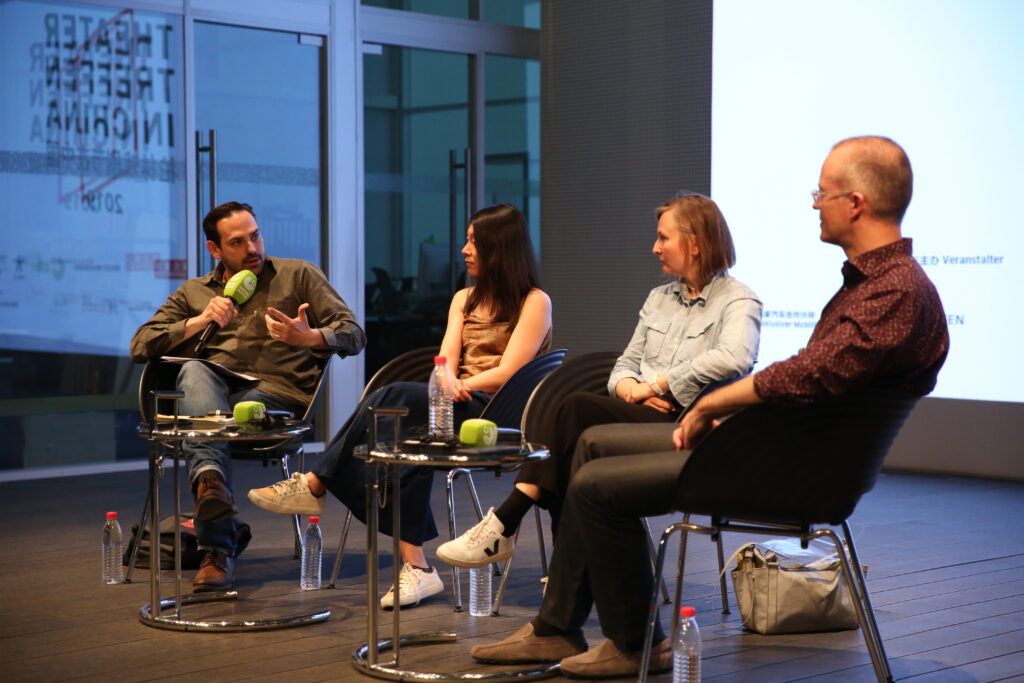
This essay is based on a talk Kai Tuchmann held during Theatertreffen in China, hosted at Goethe Institut Beijing on 16th June 2019.
ABOUT THE AUTHOR:
Kai Tuchmann is a theatre maker, based in Beijing and Berlin. His stagings and dramaturgies were invited, among others, to I Dance Hong Kong (2016), Seoul Marginal Theatre Festival (2017), Zürcher Theaterspektakel (2017), Kunstfest Weimar (2017) Festival d’Automne à Paris (2017), Wuzhen Theatre Festival (2018), and Asia Society New York (2018). Kai is a member of the Dramaturgy Faculty at China`s Central Academy of Drama and of the Performing Arts Management Faculty at the Frankfurt`s University of Music and Performing Arts. He is also a Board Member of the Marvin Carlson Theatre Center in Shanghai and New York.
This post was written by the author in their personal capacity.The opinions expressed in this article are the author’s own and do not reflect the view of The Theatre Times, their staff or collaborators.
This post was written by Kai Tuchmann.
The views expressed here belong to the author and do not necessarily reflect our views and opinions.

